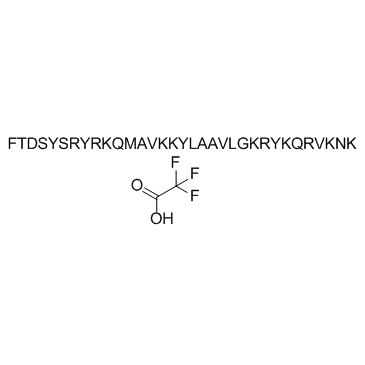PACAP (6-38), human, ovine, rat TFA |
| Catalog No.GC36839 |
PACAP (6-38), human, ovine, rat TFA is a potent PACAP receptor antagonist with IC50s of 30, 600, and 40 nM for PACAP type I receptor, PACAP type II receptor VIP1, and PACAP type II receptor VIP2, respectively.
Products are for research use only. Not for human use. We do not sell to patients.

Sample solution is provided at 25 µL, 10mM.
PACAP (6-38), human, ovine, rat TFA is a potent PACAP receptor antagonist with IC50s of 30, 600, and 40 nM for PACAP type I receptor, PACAP type II receptor VIP1, and PACAP type II receptor VIP2, respectively. IC50: 30 nM (PACAP type I receptor), 600 nM (PACAP type II receptor VIP1), 40 nM (PACAP type II receptor VIP2)[1]
An increase of dopamine (DA) content by HPLC analysis and/or cell proliferation identified by MTT assay by Dexamethasone (DEX) is also observed which can be inhibited by PACAP (6-38) at concentration sufficient to block PACAP type 1 (PAC1) receptor. Pretreatment with PAC1 receptor antagonist PACAP (6-38) at 0.1 or 1 μM for 2 h significantly blocks this increase of DA content by 1 μM DEX. The MTT assay shows that DEX increases cell proliferation. Moreover, this action is also inhibited by the pre-incubation of PACAP (6-38). PACAP (6-38) at 1μM shows no effect on DA content and cell proliferation for 24 h. However, PACAP (6-38) at 0.3 μM has been mentioned to reduce the spontaneous tyrosine hydroxylase (TH) accumulation in differentiated retinal cultured cells for 5 days[2].
Intravesical administration of the PAC1 receptor antagonist, PACAP (6-38), significantly increases intercontraction interval (2.0-fold) and void volume (2.5-fold) in NGF-OE mice. Intravesical instillation of PACAP (6-38) also decreases baseline bladder pressure in NGF-OE mice. Intravesical administration of PACAP (6-38) (300 nM) significantly (p≤0.01) reduces pelvic sensitivity in NGF-OE mice but is without effect in WT mice[3].
[1]. Gourlet P, et al. Fragments of pituitary adenylate cyclase activating polypeptide discriminate between type I and II recombinant receptors. Eur J Pharmacol. 1995 Dec 4;287(1):7-11. [2]. Yang TT, et al. Changes of dopamine content and cell proliferation by dexamethsone via pituitary adenylate cyclase-activating polypeptide in PC12 cell. Neurosci Lett. 2007 Oct 9;426(1):45-8. [3]. Girard BM, et al. Intravesical PAC1 Receptor Antagonist, PACAP(6-38), Reduces Urinary Bladder Frequency and Pelvic Sensitivity in NGF-OE Mice. J Mol Neurosci. 2016 Jun;59(2):290-9.
Average Rating: 5 (Based on Reviews and 20 reference(s) in Google Scholar.)
GLPBIO products are for RESEARCH USE ONLY. Please make sure your review or question is research based.
Required fields are marked with *




















